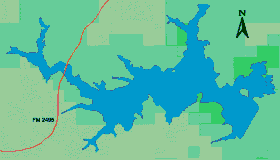Fishing
- Possession and Transport of Exotic Aquatic Species
- Licenses & Regulations
- ShareLunkers
- Fish Identification
- Fish Consumption
- Texas Freshwater Fisheries Center
Water Resources
- Texas Reservoir Levels
- US Army Corps of Engineers
- Texas Water Issues
- Golden Alga
- Aquatic Vegetation
11942 FM 848
Tyler, Texas 75707
(903) 566-1615 x 213
Jake Norman, Biologist
Local Information
Nearby State Parks:
Lake Athens
Quick Links: Fishing Regulations | Angling Opportunities | Cover & Structure | Tips & Tactics
Lake Characteristics
Location: Approximately 5 miles east of
Athens, south of FM 317 in Henderson County
Surface area: 1,799 acres
Maximum depth: 50 feet
Impounded: 1962
Water Conditions
Current Lake Level
Conservation Pool Elevation: 440 ft. msl
Fluctuation: 2 feet
Normal Clarity: Moderately clear
Reservoir Controlling Authority
Athens Municipal Water Authority
P. O. Box 229
Athens, Texas 75751
(903) 804-8501
Aquatic Vegetation
Shoreline beds of coontail, pondweed, lilies, and alligator weed, primarily above the 2495 bridge
Predominant Fish Species
Lake Records
Current
Fishing Report
Stocking History
Latest Survey Report
Lake Maps
None available
Fishing Regulations
This reservoir has special regulations on largemouth bass. See bag and size limits for this lake.
Angling Opportunities
This lake is known for largemouth bass in the 3- to 8-pound range but has produced a lake record of 14.19 pounds. Sunfishes provide excellent opportunities for fly fishing anglers and catches up to 10 inches in length are not unusual. Crappie are few in number but are usually of good size. White bass commonly reach 16-18 inches.
| Species | Poor | Fair | Good | Excellent |
|---|---|---|---|---|
| Largemouth Bass | ||||
| Catfish | ||||
| Crappie | ||||
| White Bass | ||||
| Sunfish |
Fishing Cover/Structure
Emergent vegetation is abundant in the upper end of the reservoir above the 2495 bridge. Some inundated timber is still standing at mid-lake. The dam offers riprap along the face and submerged structure is available surrounding Goat Island.
Tips & Tactics
Spring is the best time of year for largemouth bass. Fish follow typical east Texas patterns. Sunfish become more active as the water warms and can be found around stands of native vegetation. Fly fishing is particularly good from a float tube or floating platform. Crappie and white bass are most active from February through May.
